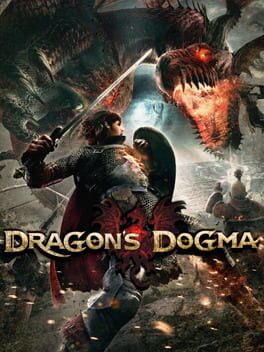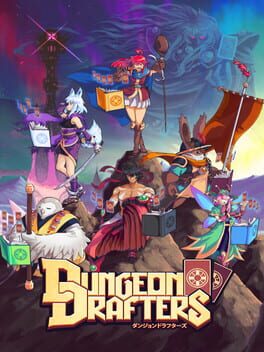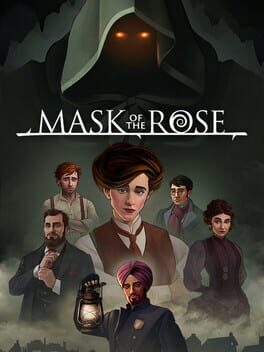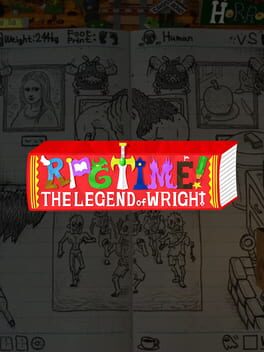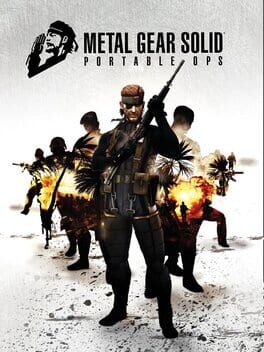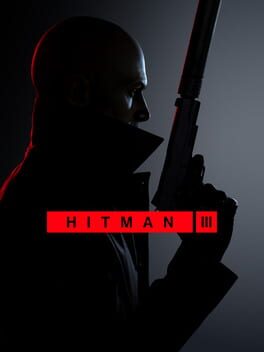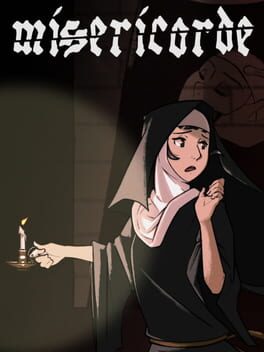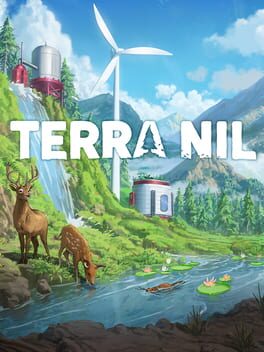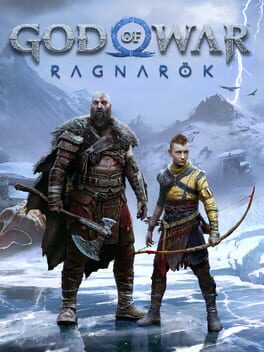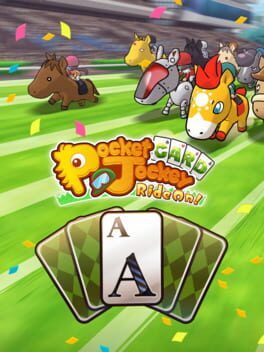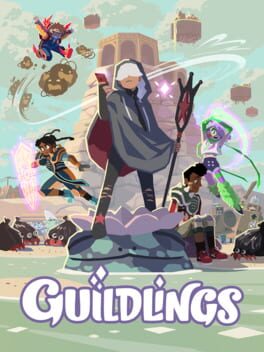nex3
BACKER
2022
Puzzle games like this, with a very clearly-defined but powerful ruleset where most of the challenge is navigating the massive possibility space, have to strike a difficult balance. If it's too easy, the game feels empty. If it's too hard, even if you can solve the puzzles you can't really understand why.
Tandis strikes this balance well. There are a few challenges where I had to use the hint functionality, but for most of them I was able to really dig in and understand why a particular sequence of transformations produced the output in question. It felt like playing with geometry, which is a great place for a game like this to land.
Tandis strikes this balance well. There are a few challenges where I had to use the hint functionality, but for most of them I was able to really dig in and understand why a particular sequence of transformations produced the output in question. It felt like playing with geometry, which is a great place for a game like this to land.
2012
This game is four or five brilliant ideas crammed into an ill-fitting Skyrim suit. The pawn-based AI party system is really cool, and the fights that really take advantage of it to have different party members focusing on different tasks are really fun. Climbing on bosses, pulling them off-balance, and focusing different body parts for different effects makes them feel challenging and exciting in a totally different way than action games in the Dark Souls lineage.
The moment-to-moment melee combat is also fascinating. In addition to reactive moves like parries and a dodge attack that gives a bonus if you perfect dodge (prefiguring Final Fantasy XVI), even the basic combo has a rhythm component to it: depending on the tempo of your button presses, you can keep comboing light sword swipes move into a medium finisher, or go for a heavy attack into a longer sequence of damaging strikes.
I discovered all of this within the first few minutes of playing the game, and I was over the moon. If this was the basic combat, imagine what it would look like at an advanced level! But sadly, that didn't pan out. The rhythm components I mentioned above are all there is; there's no complexity to the basic attacks beyond that. And outside of boss fights, the encounter design is entirely structured around throwing tons of mobs at you at once, so all the interesting reactive skills become largely irrelevant and AOEs become the order of the day. By the middle of the game, moving through the overworld became a slog of mob fight after mob fight—unavoidable because you have no direct control over your party—and desperately juggling inventory between the party to avoid overencumbering yourself.
This is the sort of game that was always destined to be a cult classic. It fights with its own goals too much to be a true masterpiece, but its moments of genius are still largely unexploited by the games that have come out since its release. It's left me very excited to see what they do with the sequel.
The moment-to-moment melee combat is also fascinating. In addition to reactive moves like parries and a dodge attack that gives a bonus if you perfect dodge (prefiguring Final Fantasy XVI), even the basic combo has a rhythm component to it: depending on the tempo of your button presses, you can keep comboing light sword swipes move into a medium finisher, or go for a heavy attack into a longer sequence of damaging strikes.
I discovered all of this within the first few minutes of playing the game, and I was over the moon. If this was the basic combat, imagine what it would look like at an advanced level! But sadly, that didn't pan out. The rhythm components I mentioned above are all there is; there's no complexity to the basic attacks beyond that. And outside of boss fights, the encounter design is entirely structured around throwing tons of mobs at you at once, so all the interesting reactive skills become largely irrelevant and AOEs become the order of the day. By the middle of the game, moving through the overworld became a slog of mob fight after mob fight—unavoidable because you have no direct control over your party—and desperately juggling inventory between the party to avoid overencumbering yourself.
This is the sort of game that was always destined to be a cult classic. It fights with its own goals too much to be a true masterpiece, but its moments of genius are still largely unexploited by the games that have come out since its release. It's left me very excited to see what they do with the sequel.
2023
This is clearly a game that has a lot of depth to it. There are five different deck archetypes with substantially different play patterns, which can be either mixed and matched or played on their own to create a stunning diversity of builds. For better or for worse, I mostly didn't engage with those builds. I just beelined to the most broken thing I could find and smashed my way through the rest of the game.
To be clear, this isn't a complaint. I love a game that gives the player the tools to break it in half, and my experience even once I'd found a few infinite combos was far from rote. Between extra enemy health bars, death effects, and combo-disrupting status ailments there was still plenty of strategizing to do on my way to killing the final boss in a single turn. And the fact that I was able to strategize, overcome those obstacles, and win so thoroughly even so is a mark of quality.
I do still think this game does put a bit too much of a thumb on the scale towards the power of its high-end cards in story mode. Every color has at least a card or two (rare and demanding though they may be) that completely cracks open the economy, and since you carry a single collection through the entire game this means that most players will eventually have a deck of tremendous power even if it's not quite as broken as mine. In a way, the card set seems more tuned towards a run-based game than a collection-based game.
It's possible that this actually does address that issue. There's a run-based mode that I never got around to trying, and it may be that that's where the game balance most thoroughly shines. But if that's the case, why hide it away?
To be clear, this isn't a complaint. I love a game that gives the player the tools to break it in half, and my experience even once I'd found a few infinite combos was far from rote. Between extra enemy health bars, death effects, and combo-disrupting status ailments there was still plenty of strategizing to do on my way to killing the final boss in a single turn. And the fact that I was able to strategize, overcome those obstacles, and win so thoroughly even so is a mark of quality.
I do still think this game does put a bit too much of a thumb on the scale towards the power of its high-end cards in story mode. Every color has at least a card or two (rare and demanding though they may be) that completely cracks open the economy, and since you carry a single collection through the entire game this means that most players will eventually have a deck of tremendous power even if it's not quite as broken as mine. In a way, the card set seems more tuned towards a run-based game than a collection-based game.
It's possible that this actually does address that issue. There's a run-based mode that I never got around to trying, and it may be that that's where the game balance most thoroughly shines. But if that's the case, why hide it away?
2023
The combat system in Final Fantasy XVI is very impressive: the core conceit of is that you have a suite of basic attacks that are always accessible but relatively weak, plus a customizable set of "Eikon abilities" that are much stronger but have relatively long cooldowns. Major enemies have a posture meter and stagger when it's emptied, giving you a few seconds of free hits with a damage multiplier. Even with just this structure, there's an intrinsic push and pull where the player is incentivized to use their abilities to push the stagger meter down while also carefully timing their cooldowns to do as much damage as possible during the stagger.
But it gets more advanced from there. The basic abilities hold a deceptive amount of complexity that takes real care to fully learn, and the Eikon abilities are multi-purpose, with clever counterplay to the enemies' movement and attacks. It's wise of them to provide an "arcade mode" that grades your performance, because this really does seem like a combat system you could go very deep on.
The main plot is also a lot of fun. I've heard people complaining that it was sold as Game of Thrones and doesn't really work as a grounded political fantasy, but where it drops that initial conceit it picks up a high-key anime intensity with a contagious joy in its own bombast. The Eikon fights aren't as mechanically deep as the primary combat, but they make up for it in a spectacle that fully justifies the graphics power of current-gen hardware.
But the game has some major gaps in its charm as well. Outside the main quest, the plot and writing is vastly spottier. There are some really lovely side quests (especially those that tie more closely to the main characters), but there are also some that are upsettingly bad, like the run of ham-fisted "everyone hates the bearers" quests just before Oriflamme. Even in the decent sidequests, the writing lacks verve, leading me to instinctively reach for my phone instead of giving it my full attention.
And the excellent combat system isn't very well-supported by everything around it. Non-boss fghts are uniformly featureless arenas full of relatively weak mobs, and because you can't easily switch Eikon loadouts a moveset optimized for one-on-one battles will have limited tools for dealing with them. The end result is a sense of chewing cardboard: not unbearable, but not a lot of fun either.
The crafting system, such as it is, is also direly underbaked. The only thing to craft are weapons and armor which, contrary to RPG convention, are just a linear series of power upgrades. If you do all the quests you will have enough materials for everything, so picking up items in the overworld or getting additional quest rewards means nothing at all.
I'm not enough of a Final Fantasy player to have a great sense of where this sits in the series as a whole, but as an occasional player of RPGs I wish it had a little more meat on the bones when it came to customization and as a player of action games I wish it had a little more thought put into the encounter design. All the same, I did have fun, and this game undeniably broke me out of a few of my comfort zones in exciting ways.
But it gets more advanced from there. The basic abilities hold a deceptive amount of complexity that takes real care to fully learn, and the Eikon abilities are multi-purpose, with clever counterplay to the enemies' movement and attacks. It's wise of them to provide an "arcade mode" that grades your performance, because this really does seem like a combat system you could go very deep on.
The main plot is also a lot of fun. I've heard people complaining that it was sold as Game of Thrones and doesn't really work as a grounded political fantasy, but where it drops that initial conceit it picks up a high-key anime intensity with a contagious joy in its own bombast. The Eikon fights aren't as mechanically deep as the primary combat, but they make up for it in a spectacle that fully justifies the graphics power of current-gen hardware.
But the game has some major gaps in its charm as well. Outside the main quest, the plot and writing is vastly spottier. There are some really lovely side quests (especially those that tie more closely to the main characters), but there are also some that are upsettingly bad, like the run of ham-fisted "everyone hates the bearers" quests just before Oriflamme. Even in the decent sidequests, the writing lacks verve, leading me to instinctively reach for my phone instead of giving it my full attention.
And the excellent combat system isn't very well-supported by everything around it. Non-boss fghts are uniformly featureless arenas full of relatively weak mobs, and because you can't easily switch Eikon loadouts a moveset optimized for one-on-one battles will have limited tools for dealing with them. The end result is a sense of chewing cardboard: not unbearable, but not a lot of fun either.
The crafting system, such as it is, is also direly underbaked. The only thing to craft are weapons and armor which, contrary to RPG convention, are just a linear series of power upgrades. If you do all the quests you will have enough materials for everything, so picking up items in the overworld or getting additional quest rewards means nothing at all.
I'm not enough of a Final Fantasy player to have a great sense of where this sits in the series as a whole, but as an occasional player of RPGs I wish it had a little more meat on the bones when it came to customization and as a player of action games I wish it had a little more thought put into the encounter design. All the same, I did have fun, and this game undeniably broke me out of a few of my comfort zones in exciting ways.
2011
I tried to make my second run through Dark Souls a contrast with my first. I always go for dextrous katana builds in my first run through these games, so coming back I wanted to do a strength-oriented build instead with heavy armor and heavier weaponry. I knew the game by this point, so I allowed myself to skip bosses and areas I wasn't interested in refighting (so long, Lost Izalith; another time, Kalameet).
But the most impactful change was streaming my run to friends over Discord, including particularly my friend @zandravandra. Zandra knows this game back to front, and she gave me some context on it that really opened my eyes to what's special about this Souls. The way the game hides its meta progression asks the player not just to engage with the game on its own terms, but to understand it so thoroughly that they're able to use the grammar of the game to subvert the destinies that seem at first unavoidable. To save Solaire, you must not only follow his route, but understand how to subvert it. To find the secret ending, you must see the ways the game prevents you from moving forward, then probe the holes in those defenses.
This demonstrates a tremendous amount of faith in the player's willingness to engage with the game over and over in order to truly divine its secrets. The willingness to allow each player to experience a different subset of the game clearly still persists in the later games (Elden Ring in particular is a master class in this), but even there as long as you touch everything once you'll see all there is to see. Dark Souls takes one bold step further by making so much at the heart of the game's text so readily missable, thereby demanding that players not only engage thoroughly but thoughtfully as well.
Even if you wanted to do that today, I'm not sure it would matter. We live in an age of endless wikis and discords which instantaneously disseminate information to players. That's not necessarily a bad thing—to catalog a thing so painstakingly is another way to love it—but it does mean that vanishingly few players will play a game five times through without ever looking up its secrets on the internet. But still, Dark Souls remains, a brilliant monument to that moment when it was possible to make a game just like this.
But the most impactful change was streaming my run to friends over Discord, including particularly my friend @zandravandra. Zandra knows this game back to front, and she gave me some context on it that really opened my eyes to what's special about this Souls. The way the game hides its meta progression asks the player not just to engage with the game on its own terms, but to understand it so thoroughly that they're able to use the grammar of the game to subvert the destinies that seem at first unavoidable. To save Solaire, you must not only follow his route, but understand how to subvert it. To find the secret ending, you must see the ways the game prevents you from moving forward, then probe the holes in those defenses.
This demonstrates a tremendous amount of faith in the player's willingness to engage with the game over and over in order to truly divine its secrets. The willingness to allow each player to experience a different subset of the game clearly still persists in the later games (Elden Ring in particular is a master class in this), but even there as long as you touch everything once you'll see all there is to see. Dark Souls takes one bold step further by making so much at the heart of the game's text so readily missable, thereby demanding that players not only engage thoroughly but thoughtfully as well.
Even if you wanted to do that today, I'm not sure it would matter. We live in an age of endless wikis and discords which instantaneously disseminate information to players. That's not necessarily a bad thing—to catalog a thing so painstakingly is another way to love it—but it does mean that vanishingly few players will play a game five times through without ever looking up its secrets on the internet. But still, Dark Souls remains, a brilliant monument to that moment when it was possible to make a game just like this.
2023
As ever, I really adore the world Failbetter has built and I find their house writing style delightful. So it was with no small measure of disappointment that I quickly realized that their newest entry wasn't landing for me the way I had eagerly hoped it would. It seemed set up to succeed: the focus on story plays to the studio's strengths, the setting (far earlier in the timeline than Fallen London or the Sunless games) was intriguing, and the modular-narrative is a particular fascination of mine.
But it just doesn't quite cohere. The game's triggers feel a little off-kilter, giving me options to ask or construct stories about things I haven't seen while preventing access to what seem like obvious next steps or conclusions to draw. I'd frequently end up with quests emblazoned with portraits of character who were never available, or that seemed to peter out with no real conclusion. The game's promise of pursuing whatever relationship you wanted with any character clearly stretched its resources thin: each individual interaction (romantic or platonic) is too brief to convey real character either of the protagonist or their prospective partner.
The whole of the game feels like it tries to give the player so much choice in what they do, who they talk to, and in what manner, that it's unable to keep up with itself. Because almost anything is possible, nothing that actually happens has any weight behind it. If the game were a little more mechanical it might feel like I was writing my own stories with the game pieces, but it's too invested in getting actual words in front of the player to commit to that line. It could also be less mechanical and push the player onto fewer, more well-defined quest lines in a moderately-open framework and bring more focus to the writing, but it's too ambitious for that.
All this said, it's still release week for this game and I know content patches are in the pipes. I'm going to put it aside for now and come back later, and I'm holding out hope that it'll see much improvement by then.
But it just doesn't quite cohere. The game's triggers feel a little off-kilter, giving me options to ask or construct stories about things I haven't seen while preventing access to what seem like obvious next steps or conclusions to draw. I'd frequently end up with quests emblazoned with portraits of character who were never available, or that seemed to peter out with no real conclusion. The game's promise of pursuing whatever relationship you wanted with any character clearly stretched its resources thin: each individual interaction (romantic or platonic) is too brief to convey real character either of the protagonist or their prospective partner.
The whole of the game feels like it tries to give the player so much choice in what they do, who they talk to, and in what manner, that it's unable to keep up with itself. Because almost anything is possible, nothing that actually happens has any weight behind it. If the game were a little more mechanical it might feel like I was writing my own stories with the game pieces, but it's too invested in getting actual words in front of the player to commit to that line. It could also be less mechanical and push the player onto fewer, more well-defined quest lines in a moderately-open framework and bring more focus to the writing, but it's too ambitious for that.
All this said, it's still release week for this game and I know content patches are in the pipes. I'm going to put it aside for now and come back later, and I'm holding out hope that it'll see much improvement by then.
What a brilliant mess this game is. Breath of the Wild, when it came out, felt like a flawless jewel. You could complain (and I did!) about how weapon durability disincentivized engaging with the combat, or bemoan the relative weakness of the dungeons, but those were all gripes around the edges of the monumental fact that they had near-perfectly delivered on the promise that open world games had been making for decades. It was reacting to the larger world of video games in a way Nintendo largely refused to do, and at the same time it was like nothing we'd seen before.
Tears of the Kingdom is very much like something we've seen before. The core conceit is identical to its predecessor despite the different array of magical abilities, and even the plot is largely unchanged: Zelda is gone, again. The great evil is back, again. Climb the towers, find the shrines, do the dungeons, save the princess.
But to see this as just more Breath of the Wild is also to miss the point. The first game was constrained by its immaculate crystalline structure. It had to be the open-world game. Tears of the Kingdom could never be that because that's already been done, and it uses the extra freedom of the younger sibling to get weird with it.
In a lot of ways, this weirdness isn't for the best. The control scheme is onerous to say the least, particularly when engaging with the construction mechanics. The combat scaling is way off, with enemies either taking ten hits from a top-tier weapon or dying immediately. Once you get a feel for the patterns in the depths, they're largely empty and repetitive.
But damn if it isn't also interesting. The truth I keep coming back to is this: although I think Breath of the Wild is a "better" game in some abstract design sense, I lost interest after about 100 hours. Meanwhile, I've spent twice that playing Tears of the Kingdom and I'd be happy to continue if only there weren't more games to get around to.
This game takes huge swings, and while not all of them hit the ones that do are incredible. You only have to glance online to see the videos of mechs and drones players have built. The depths feel genuinely terrifying. Fusion is fully brilliant, simultaneously solving durability and making room for countless moments of discovery. There are genuinely good boss fights for maybe the first time in any Zelda game.
And I could rhapsodize endlessly about the way the world interconnects with itself. To my mind, the only real justification for the concept of "open world" is the idea that your actions as a player have non-local effects on the world you exist in. Breath of the Wild gestured at this, but Tears of the Kingdom fully embraces it. Conversations continue across the map from one another as NPCs wander from place to place. Refugees you meet in one region return home to another as you rebuild their houses. The world feels alive in a way that games seldom attempt and almost never achieve, and I love it for that.
Tears of the Kingdom is very much like something we've seen before. The core conceit is identical to its predecessor despite the different array of magical abilities, and even the plot is largely unchanged: Zelda is gone, again. The great evil is back, again. Climb the towers, find the shrines, do the dungeons, save the princess.
But to see this as just more Breath of the Wild is also to miss the point. The first game was constrained by its immaculate crystalline structure. It had to be the open-world game. Tears of the Kingdom could never be that because that's already been done, and it uses the extra freedom of the younger sibling to get weird with it.
In a lot of ways, this weirdness isn't for the best. The control scheme is onerous to say the least, particularly when engaging with the construction mechanics. The combat scaling is way off, with enemies either taking ten hits from a top-tier weapon or dying immediately. Once you get a feel for the patterns in the depths, they're largely empty and repetitive.
But damn if it isn't also interesting. The truth I keep coming back to is this: although I think Breath of the Wild is a "better" game in some abstract design sense, I lost interest after about 100 hours. Meanwhile, I've spent twice that playing Tears of the Kingdom and I'd be happy to continue if only there weren't more games to get around to.
This game takes huge swings, and while not all of them hit the ones that do are incredible. You only have to glance online to see the videos of mechs and drones players have built. The depths feel genuinely terrifying. Fusion is fully brilliant, simultaneously solving durability and making room for countless moments of discovery. There are genuinely good boss fights for maybe the first time in any Zelda game.
And I could rhapsodize endlessly about the way the world interconnects with itself. To my mind, the only real justification for the concept of "open world" is the idea that your actions as a player have non-local effects on the world you exist in. Breath of the Wild gestured at this, but Tears of the Kingdom fully embraces it. Conversations continue across the map from one another as NPCs wander from place to place. Refugees you meet in one region return home to another as you rebuild their houses. The world feels alive in a way that games seldom attempt and almost never achieve, and I love it for that.
This is absolutely bursting with charm. The joy it takes in the materiality of its arts and crafts framing is unparalleled, constantly playing little games and jokes with the idea that it is a physical game constructed by your schoolyard friend while also overtly juxtaposing that with the fact that it is in fact a video game. This kind of clever play between the represented materials and the actual materials is something I rarely see outside of Kojipro games, so it's kind of shocking to see it in this little indie game for children.
At the same time, it's impossible to forget that this game is aimed at kids. The writing is often fun, but it's in a very simple and educational register, more Humongous Entertainment than Square Enix. The moment-to-moment mechanical movement is intentionally slow and deliberate, often requiring extra confirmations or slow-to-progress dialog. This can make the game feel sluggish at times even though it's relatively short and certainly not difficult.
Nor does it have much real mechanical depth: it's essentially a series of light puzzles and minigames, with an RPG theme laid on top like a costume. It's fun enough to bounce your way through, but the difficulty is low and there's nothing at all crunchy. On the other hand, it also has a needlessly sexy demon king, so who's counting?
At the same time, it's impossible to forget that this game is aimed at kids. The writing is often fun, but it's in a very simple and educational register, more Humongous Entertainment than Square Enix. The moment-to-moment mechanical movement is intentionally slow and deliberate, often requiring extra confirmations or slow-to-progress dialog. This can make the game feel sluggish at times even though it's relatively short and certainly not difficult.
Nor does it have much real mechanical depth: it's essentially a series of light puzzles and minigames, with an RPG theme laid on top like a costume. It's fun enough to bounce your way through, but the difficulty is low and there's nothing at all crunchy. On the other hand, it also has a needlessly sexy demon king, so who's counting?
This is a fascinating little object. Of the Metal Gear games not written by Kojima, this seems to be the one that's closest to actual canon, with Kojima himself reportedly holding different positions on the subject at different times.
The plot acts as almost a direct sequel to MGS3, and although it has some weird threads that seem to have been totally dropped (like the shadowy figure said to have orchestrated all the events in the prior game) in many ways it fits well within the canon. The conflict between different people's interpretation of The Boss's dream is at the heart of the series, and this game provides one of the clearest explications of that: Gene's and Big Boss's views of what a nation of soldiers could be is front and center. The tension between the CIA and the DOD is similarly a clever real-world touch that follows the political interests of the series as a whole.
Mechanically this is much less "MGS3 2" and much more "MGSV 0". Here is the genesis of a vision of Metal Gear as discrete levels you can revisit on your own recognizance rather than a linear path through a story. Here is the first time the idea of "a nation of soldiers" is encoded mechanically as recruiting enemies in-game. This recruitment mechanic is achingly clunky, involving massive amounts of time just searching for hiding spots and dragging bodies for minimal in-game payoff. But it's so immediately enticing the player is compelled to engage with it anyway. It was wise of them to expand this into an entire game in its own right (and to dramatically smooth out its mechanics).
The game has its frustrations, as well. Boss fights are frustrating on beyond their usual annoyance, not just because of the clunky PSP camera controls but also the nature of the game itself. The player has extremely limited inventory slots and is generally incentivized to go into levels with them empty so as to be able to carry home more resources. Health and particularly stamina are often low across multiple levels. But when a boss fight shows up by surprise after an involved sneaking section, the player has only the resources on hand to fight it. If they think one particular piece of equipment is needed, they have to do the entire level over just to test their theory.
For that reason, I set the game down upon encountering the Null fight and just watched the rest of the dialog and cutscenes on YouTube. But even so, I'm fond of it: it's a black sheep, it's undeniably flawed, but the series after this (and particularly my favorite MGS game) wouldn't be as strong without this strange entry's existence.
The plot acts as almost a direct sequel to MGS3, and although it has some weird threads that seem to have been totally dropped (like the shadowy figure said to have orchestrated all the events in the prior game) in many ways it fits well within the canon. The conflict between different people's interpretation of The Boss's dream is at the heart of the series, and this game provides one of the clearest explications of that: Gene's and Big Boss's views of what a nation of soldiers could be is front and center. The tension between the CIA and the DOD is similarly a clever real-world touch that follows the political interests of the series as a whole.
Mechanically this is much less "MGS3 2" and much more "MGSV 0". Here is the genesis of a vision of Metal Gear as discrete levels you can revisit on your own recognizance rather than a linear path through a story. Here is the first time the idea of "a nation of soldiers" is encoded mechanically as recruiting enemies in-game. This recruitment mechanic is achingly clunky, involving massive amounts of time just searching for hiding spots and dragging bodies for minimal in-game payoff. But it's so immediately enticing the player is compelled to engage with it anyway. It was wise of them to expand this into an entire game in its own right (and to dramatically smooth out its mechanics).
The game has its frustrations, as well. Boss fights are frustrating on beyond their usual annoyance, not just because of the clunky PSP camera controls but also the nature of the game itself. The player has extremely limited inventory slots and is generally incentivized to go into levels with them empty so as to be able to carry home more resources. Health and particularly stamina are often low across multiple levels. But when a boss fight shows up by surprise after an involved sneaking section, the player has only the resources on hand to fight it. If they think one particular piece of equipment is needed, they have to do the entire level over just to test their theory.
For that reason, I set the game down upon encountering the Null fight and just watched the rest of the dialog and cutscenes on YouTube. But even so, I'm fond of it: it's a black sheep, it's undeniably flawed, but the series after this (and particularly my favorite MGS game) wouldn't be as strong without this strange entry's existence.
2021
The third entry in what would become known as the "World of Assassination trilogy" certainly has the absolute strongest levels in the series. Dartmoor and Berlin present compelling twists on the core formula that expand upon the core of what makes it compelling: it presents levels as living worlds, intricate clockwork dollhouses that the player can poke to see what happens. Dubai and Ambrose Island are excellent bread-and-butter Hitman levels, which is crucial for making the game feel whole. And Chongqing stands out as having possibly the best background character writing in a series which is known for excellent background character writing.
(Mendoza is mostly there, but suffers from a few odd mismatches between how it signals the player to play and the modes of play it actually offers. It's certainly fun for the most part, but feels decidedly less baked than the rest of the game.)
The only serious drag on this game is its increased interest in linearity in service of plot. Although I think the plot itself is well-done, the way it intersects with the game itself—the escape sequence the first time you play Chongqing and the whole of Carpathian Mountains—doesn't play to the series's strengths. Hitman is intrinsically a non-linear experience that excels at creating a holistic view of a story through glimpses of small moments and conversations. Trying to force that into straightforward "move through these zones and solve these puzzles" mechanics weakens the storytelling and leads to uninteresting zones. But fortunately, that's a small part of this otherwise excellent capstone to one of my favorite series.
(Mendoza is mostly there, but suffers from a few odd mismatches between how it signals the player to play and the modes of play it actually offers. It's certainly fun for the most part, but feels decidedly less baked than the rest of the game.)
The only serious drag on this game is its increased interest in linearity in service of plot. Although I think the plot itself is well-done, the way it intersects with the game itself—the escape sequence the first time you play Chongqing and the whole of Carpathian Mountains—doesn't play to the series's strengths. Hitman is intrinsically a non-linear experience that excels at creating a holistic view of a story through glimpses of small moments and conversations. Trying to force that into straightforward "move through these zones and solve these puzzles" mechanics weakens the storytelling and leads to uninteresting zones. But fortunately, that's a small part of this otherwise excellent capstone to one of my favorite series.
It's hard to accurately judge a mystery thriller that's only half-complete. The undeniable strength of the story so far is its compelling cast of characters, each one with her own hidden depths and all collectively with histories and interactions between them that unfold before the player's eyes. This is a good sign: these relationships are the threads from which the fabric of a good mystery is woven.
But Misericorde cuts a lot of checks for drama in its first volume that as yet we can only hope get covered in the finale. A story like this lives and dies by its meticulous attention to plotting detail, and the indicators so far have been mixed. There are certainly some compelling twists, turns, and foreshadowings in this volume alone; but there's also a fair amount of awkward maneuvering just to get the right characters having conversations, as well as the occasional seeming plot hole and anachronism.
But I don't want to second guess this too much when much is left unknown. I'm foregoing a rating for this entirely because it's simply not finished, and unlike some genres it's impossible to truly judge this without knowing the full arc of the plot. I will certainly say this much: I'm plenty compelled to want to pick up the next one as soon as it drops.
But Misericorde cuts a lot of checks for drama in its first volume that as yet we can only hope get covered in the finale. A story like this lives and dies by its meticulous attention to plotting detail, and the indicators so far have been mixed. There are certainly some compelling twists, turns, and foreshadowings in this volume alone; but there's also a fair amount of awkward maneuvering just to get the right characters having conversations, as well as the occasional seeming plot hole and anachronism.
But I don't want to second guess this too much when much is left unknown. I'm foregoing a rating for this entirely because it's simply not finished, and unlike some genres it's impossible to truly judge this without knowing the full arc of the plot. I will certainly say this much: I'm plenty compelled to want to pick up the next one as soon as it drops.
2023
This is plenty cute as a way of creating little ecoscapes and feeling a sense of accomplishment and personalization with the way they turn out, and I enjoyed my way through the main campaign. The whole thing feels scant, though—what I describe as the "main campaign" is really just four brief scenarios easy enough to blast through in a day, with four more in the same biomes constituting the "postgame".
The mechanical core of this is similarly a bit threadbare. Even if the campaign had more depth (or a replayable random game mode like most strategy games), I don't think I'd have that much interest in playing that much more of it. Most of the action amounts to following the game's instructions as it leads you by the hand, and most of the complexity comes from not knowing what's coming next. Playing much more than the introduction to each biome would just feel like going through the motions.
The mechanical core of this is similarly a bit threadbare. Even if the campaign had more depth (or a replayable random game mode like most strategy games), I don't think I'd have that much interest in playing that much more of it. Most of the action amounts to following the game's instructions as it leads you by the hand, and most of the complexity comes from not knowing what's coming next. Playing much more than the introduction to each biome would just feel like going through the motions.
2022
It should not be possible for a platform-defining AAA game in 2022 to have writing this good. Everything I know about the material realities of game production make me believe that anything this nuanced, this heartfelt, this willing to sacrifice "gaminess" in exchange for a truer and deeper story, should crumple like cardboard under the sheer size of teams needed to coordinate a game of this size and expense. And yet: here it is. A top notch example of writing not just for games but for storytelling as a whole, not just sitting in an 80 hour video game but earning the time it asks you to spend on it.
The writing is easily enough to make this game worth playing, but the rest of it is certainly solid enough not to turn a player away. The core combat systems are very strong, but they're hampered by the fact that the encounter design doesn't seem to know quite what to do with it. The player's moveset is built around a Dark Souls-style framework of asking the player to understand and commit to the wind-ups of their attacks in order to land powerful hits, but the battles don't seem to understand this. Enemies will teleport around the arena and only stagger unpredictably as though they're meant for a style of game much more like the original God of War series, effectively punishing the player at random for trying to reason through combat like the system seems to demand.
The encounters also lean heavily on fights with multiple enemies to dial up the difficulty. Although there are a fair number of (delightful!) fights with particularly tricky single enemies, the more challenging fights involving groups almost uniformly suck. Again, the combat system doesn't seem to be designed for this: enemies can freely attack even when they're offscreen, meaning that any commitment the player makes to attack the enemy they're focused on can just get broken by a projectile or mob slamming in from nowhere.
The right hand doesn't seem to know what the left hand is doing, which is honestly what I expect everywhere in a game this size. The fact that the combat works as well as it does given that is still impressive, and the fact that the writing is straight up excellent is nothing short of a miracle.
The writing is easily enough to make this game worth playing, but the rest of it is certainly solid enough not to turn a player away. The core combat systems are very strong, but they're hampered by the fact that the encounter design doesn't seem to know quite what to do with it. The player's moveset is built around a Dark Souls-style framework of asking the player to understand and commit to the wind-ups of their attacks in order to land powerful hits, but the battles don't seem to understand this. Enemies will teleport around the arena and only stagger unpredictably as though they're meant for a style of game much more like the original God of War series, effectively punishing the player at random for trying to reason through combat like the system seems to demand.
The encounters also lean heavily on fights with multiple enemies to dial up the difficulty. Although there are a fair number of (delightful!) fights with particularly tricky single enemies, the more challenging fights involving groups almost uniformly suck. Again, the combat system doesn't seem to be designed for this: enemies can freely attack even when they're offscreen, meaning that any commitment the player makes to attack the enemy they're focused on can just get broken by a projectile or mob slamming in from nowhere.
The right hand doesn't seem to know what the left hand is doing, which is honestly what I expect everywhere in a game this size. The fact that the combat works as well as it does given that is still impressive, and the fact that the writing is straight up excellent is nothing short of a miracle.
2019
The comedy writing and characterization going on here is really tremendous. Every line of dialog is a delight in and of itself, and the degree to which characters interact with one another based on who’s in your party is incredible for a game with such a small team. The amount of writing this must have taken, for stuff that’s mostly not going to be seen on a single playthrough! It’s an admirable dedication to making the world feel alive and reactive.
The single glaring flaw with this game (other than its Apple Arcade exclusivity, which, needs must) is that it’s undeniably incomplete. The website which described it as “episodic” is now down. I can only cross my fingers and hope that neither COVID nor poor numbers doomed Guildlings to be forever a single act bereft of elaboration.
The single glaring flaw with this game (other than its Apple Arcade exclusivity, which, needs must) is that it’s undeniably incomplete. The website which described it as “episodic” is now down. I can only cross my fingers and hope that neither COVID nor poor numbers doomed Guildlings to be forever a single act bereft of elaboration.

